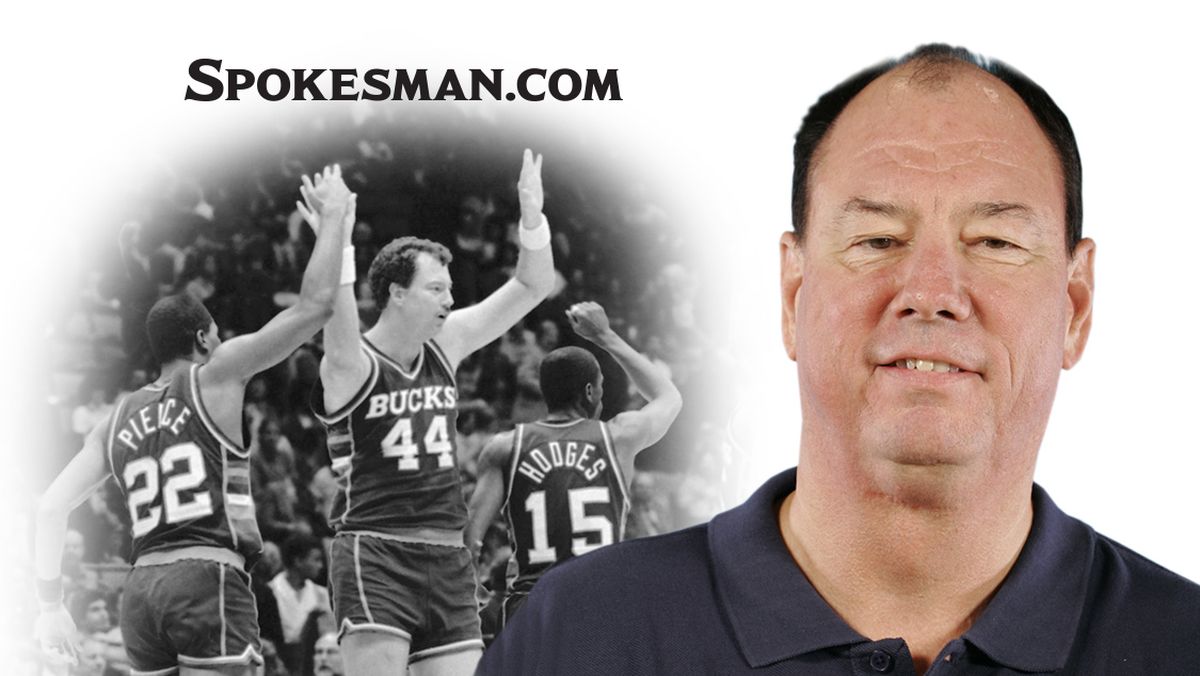After passing on Gonzaga in the 1970s, former NBA big man Paul Mokeski says Zags rank among his favorites today

While Paul Mokeski didn’t live even a full year in Spokane, where he was born, it wasn’t out of the realm of possibility that the future NBA big man would have played for Gonzaga.
His father, Casmer, graduated from Gonzaga in 1952, and when Mokeski visited the campus during his recruiting process in the mid-1970s, he liked it. Back then Gonzaga – still a couple years from Dan Fitzgerald’s first stint as its coach – wasn’t yet on par with Kansas or UCLA, who were also recruiting him.
“I visited Gonzaga more for my dad than anything,” Mokeski said last week. “I really enjoyed it, but it was really small.”
He also visited Washington State because of coach George Raveling, he said. Ultimately the 7-footer Mokeski chose Kansas. He played four seasons in Lawrence from 1975 to 1979 and went on to a 12-year NBA career, highlighted by seven years with the Milwaukee Bucks.
The Bucks were good then – the Eastern Conference’s third-best regular-season team from 1981 to 1988 – but they shared the East with the Boston Celtics and Philadelphia 76ers, either of which represented the conference each of those seasons.
“We were very good for the whole time but we just couldn’t get over that hump,” Mokeski said. “We would run into Philly with Dr. J. (Julius Erving), the Celtics and Larry Bird and that group, and it was very frustrating.”
So to see the Bucks now in the NBA Finals – they lead 3-2 heading into Tuesday night’s Game 6 in Milwaukee – pleases Mokeski, who never got farther than the conference finals as a player.
“I’m pretty much a Buck at heart,” he said.
Mokeski’s move from Spokane to California when he was nine months old was just the first of more than two dozen in his life. Mokeski’s professional career began in Houston and then took him to Milwakuee, Detroit, Cleveland and Golden State. He averaged 4.0 points and 3.4 rebounds over his playing career, starting 38 times in 694 games.
During his 23-year coaching and scouting career that followed, he lived in at least a dozen cities and traveled to 42 countries. So, after 28 moves, he said, it’s been nice to just be in one spot the last three years. He and Linda, his wife of 40 years, now live in Las Vegas.
When Mokeski first got into coaching in the mid-90s, the transition wasn’t as smooth as he hoped. Being a big man, he said he got stereotyped as someone who could only coach other big men. He settled for assistant coaching positions in the NBA’s development league, or the CBA, or for international teams like Jamaica and Great Britain.
Throughout that time, he picked up what he could from the various coaches he worked with.
“If you’re smart, like I think I am sometimes, you take all the good stuff and when you have an opportunity you use that,” Mokeski said. “You use it to make your own coaching philosophy.”
Eventually he became an advance scout for the Dallas Mavericks, a job that sent him on the road 20 to 25 days a month, watching the Mavericks’ next opponents. He said he produced reports that were 20- to 30-pages long, noting teams’ substitution patterns, last-second plays, play calls and other strategic details.
It was grueling work, but now he has almost an encyclopedic knowledge of play calls from the great coaches he watched, like Gregg Popovich, Larry Brown, Rick Carlisle, Mike D’Antoni, he said.
“You get an up-close and personal chance to watch the best coaches in the game coach,” he said. “I have books of diagrams and play calls of all those teams and coaches.”
Mokeski never got the chance to be an NBA head coach, but he still follows the game closely. He also co-hosts a weekly podcast called “The D.Gerv and Big Mo Show” with Derrick Gervin.
“It’s about old-school basketball and new-school,” he said.
He still keeps up with college basketball as well, including Gonzaga, though not simply because of his father’s connection to Spokane.
“I enjoy the way they play,” Mokeski said. “In the big scheme of things (they are) with the Kansases and the Dukes.
“It’s like what the Suns and Bucks are now. It used to be Philly, the Lakers, Boston. Now you have two middle-market teams in the Finals, and that’s what the Zags are every year. I like that, and I like the way they play. … That’s the way I like to coach.”